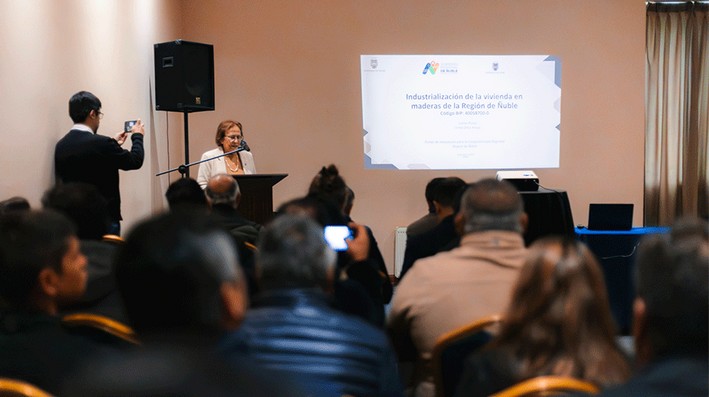With the participation of regional authorities, representatives from the Universidad del Bío-Bío, and small and medium-sized enterprises in the timber and construction sectors, the official launch of the project "Industrialization of Wooden Housing for the Ñuble Region" took place in Chillán. The initiative is funded by the Ñuble Regional Government through the Innovation Fund for Competitiveness (FIC-R) and executed by the Universidad del Bío-Bío.
The project will run for two years and includes various activities aimed at strengthening local capacities to advance wooden housing industrialization. These include seminars, workshops, courses, and training focused on updating processes and technological competencies. These efforts will help establish productive linkages between sawmills, AIC sector companies, real estate firms, and public entities, with the goal of driving a new industrial segment that adds value to the sector and meets the needs of the region.
In this context, the Vice Chancellor of the Universidad del Bío-Bío, Julia Fawaz, highlighted the initiative's impact on the region's productive ecosystem:
"This project is a source of great satisfaction for the University because it reflects our commitment as a state, public, and bi-regional institution to dedicate all our capabilities to the development of the Biobío and Ñuble regions. This initiative directly addresses the needs of Ñuble. I have spoken with representatives of SMEs, and they have high hopes of integrating into this project by supplying raw materials and fostering active ties with the regional industry," emphasized Fawaz.
Meanwhile, the Head of the Infrastructure and Transportation Division of the Ñuble Regional Government, Cristian Quiroz, explained the reasons behind the financial support for the project:
"Technological innovation, productive development, and the alignment of public, academic, and private efforts to solve public issues are part of our regional development strategy. Second, we also aim to contribute innovative methodologies and processes to the National Emergency Housing Plan. Promoting these experiences and capabilities among SMEs in our region—such as sawmills, construction companies, sponsoring entities, and others—is a significant step in that direction," Quiroz explained.
Similarly, he emphasized the Regional Government's trust in the executing institution: "As the Regional Government, we trust in the nearly 200 million pesos allocated to this FIC project, to be executed by a public, regional university with a social commitment, like the Universidad del Bío-Bío, and to transfer these benefits to the construction SMEs of the region."
Meanwhile, the alternate project director, Virna Ortiz Araya, discussed the strategic components of the proposal. "The project includes three main pillars: first, the integration of local companies through courses, seminars, and technical assistance to strengthen the value chain in industrialized wooden construction; second, the adoption of technologies to improve the sector's production processes; and third, a technological tour to expose regional SMEs to concrete experiences in this field. Additionally, key data will be gathered to build a regional database, enabling economic evaluations and projecting the added value this model can bring to Ñuble's businesses," she concluded.
Complementing this, the project director, Carlos Rozas, stated: "Through seminars, workshops, technical assistance, courses, and training, we aim to strengthen capacities in wooden housing industrialization in the Ñuble Region. All these activities are funded by the Regional Government, allowing them to be offered completely free of charge to local small and medium-sized enterprises," Rozas noted.
Beneficiaries
The representative of Piedra Redonda Construction, Claudio Pacheco, praised the initiative and highlighted the project's contribution to strengthening the sector.
"Promoting wooden housing industrialization not only drives innovation and sustainability but also opens new opportunities for SMEs in the Region. The comprehensive approach—including seminars, workshops, technical visits, and free training over two years—demonstrates a serious commitment to the industry's development and the improvement of its productive capacities," Pacheco emphasized.
Similarly, the R&D Manager of Arxada Quimetal, Cristian Barría, stated: "Our participation in the launch, as an associated company of the project, represents a great opportunity to further enhance the comparative advantages offered by the Ñuble Region in the production and use of wood as a construction material, in a context of climate change and the search for sustainable solutions."
Source:La Discusión







Comments (0)
No comments yet. Be the first to comment!
Leave a comment